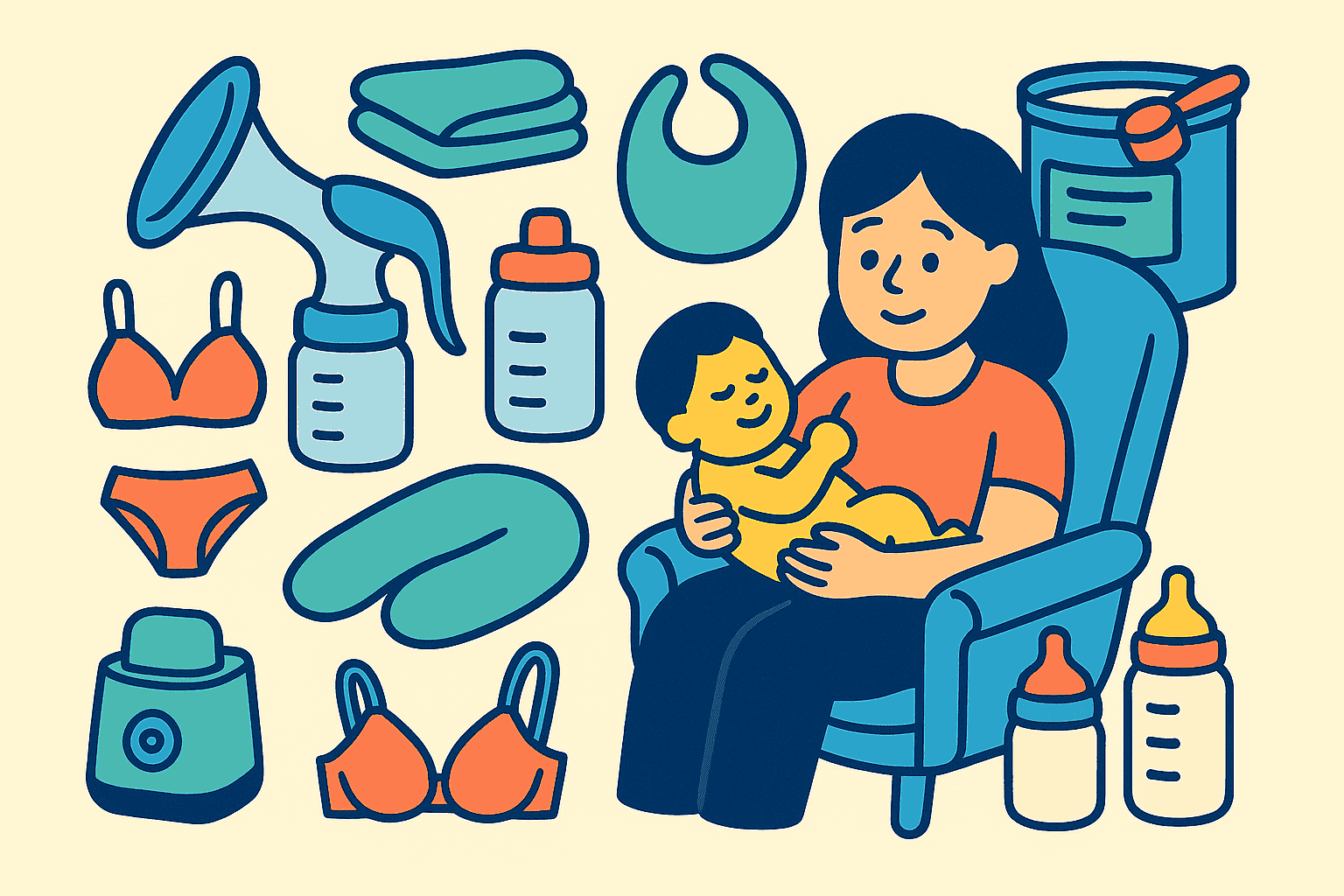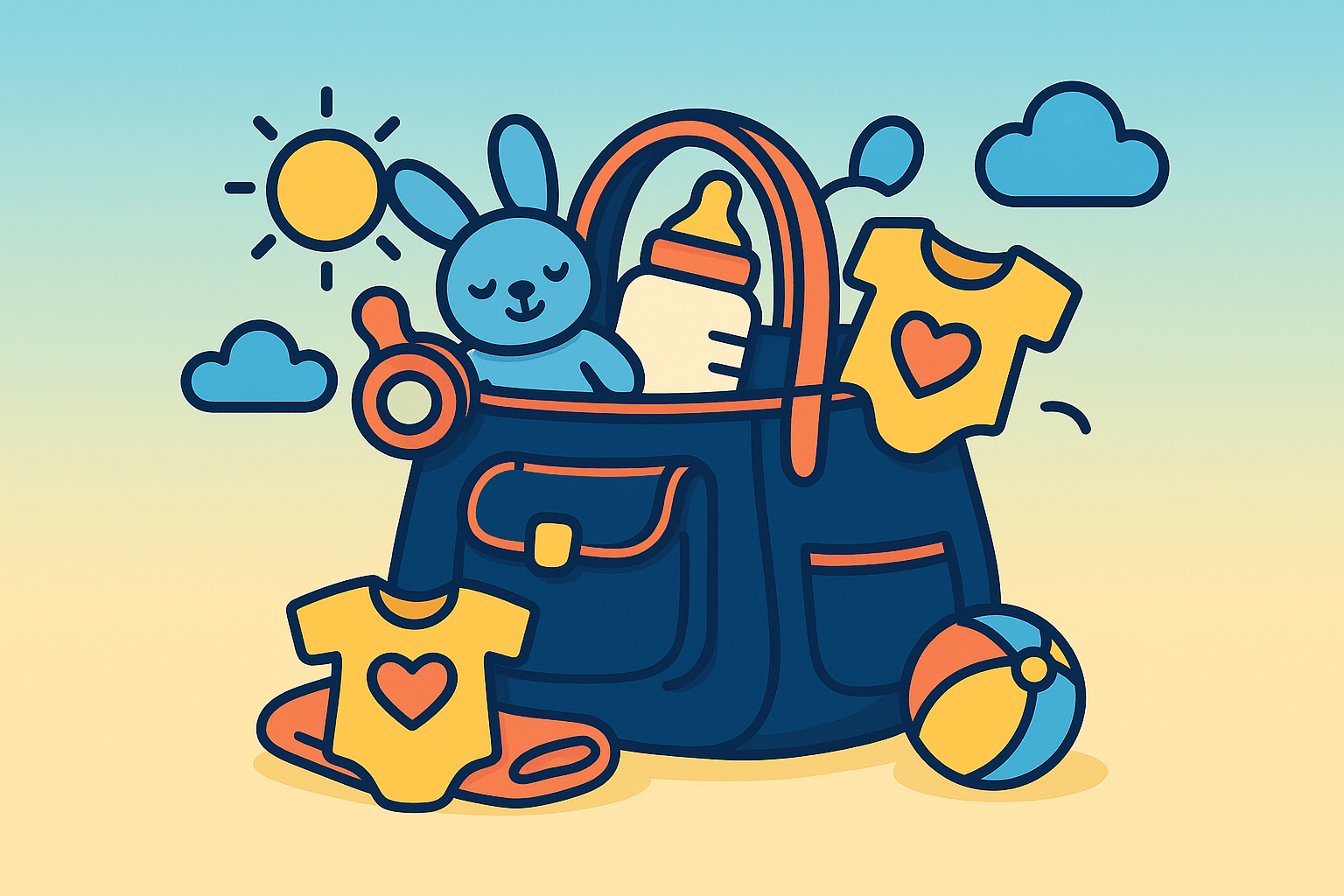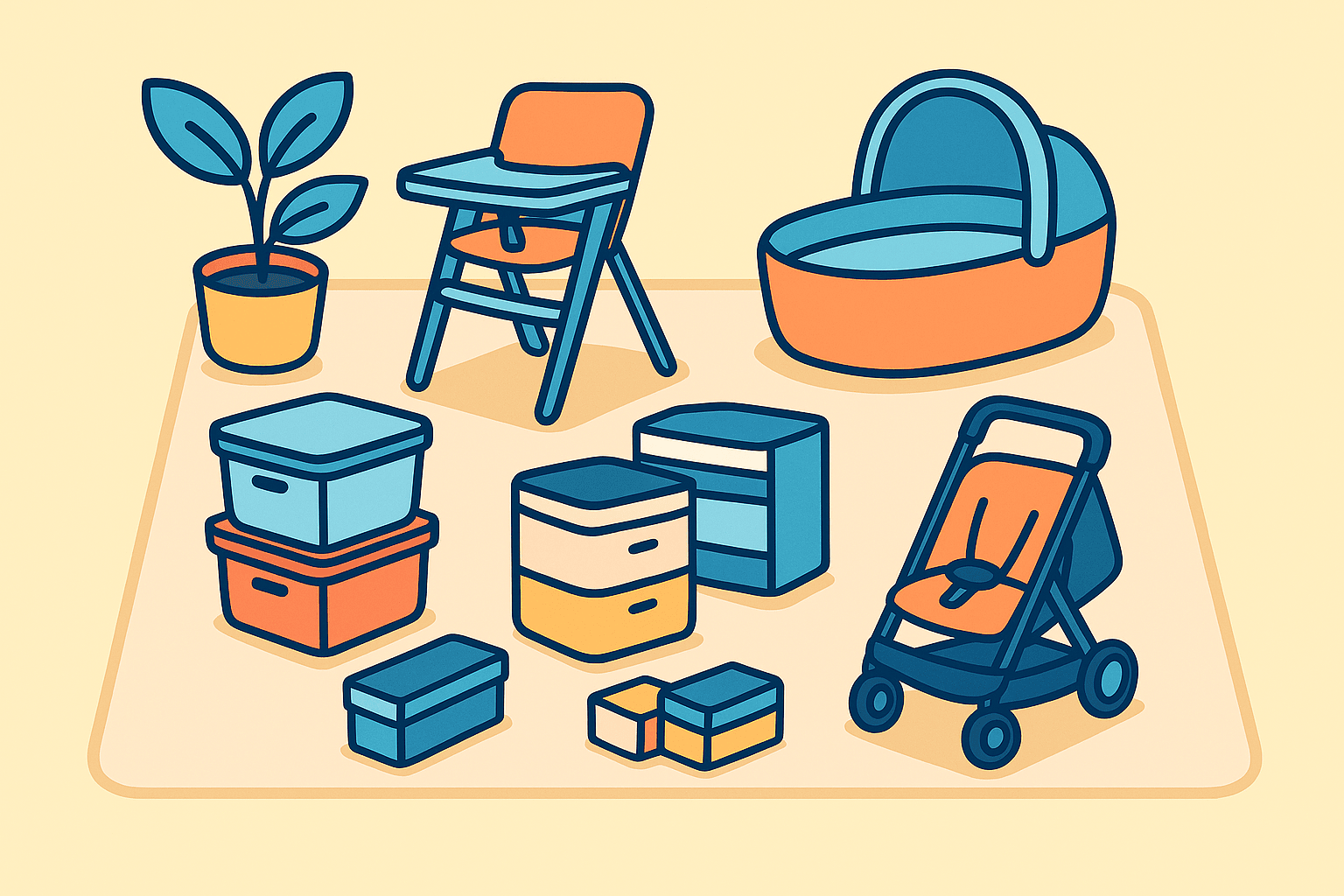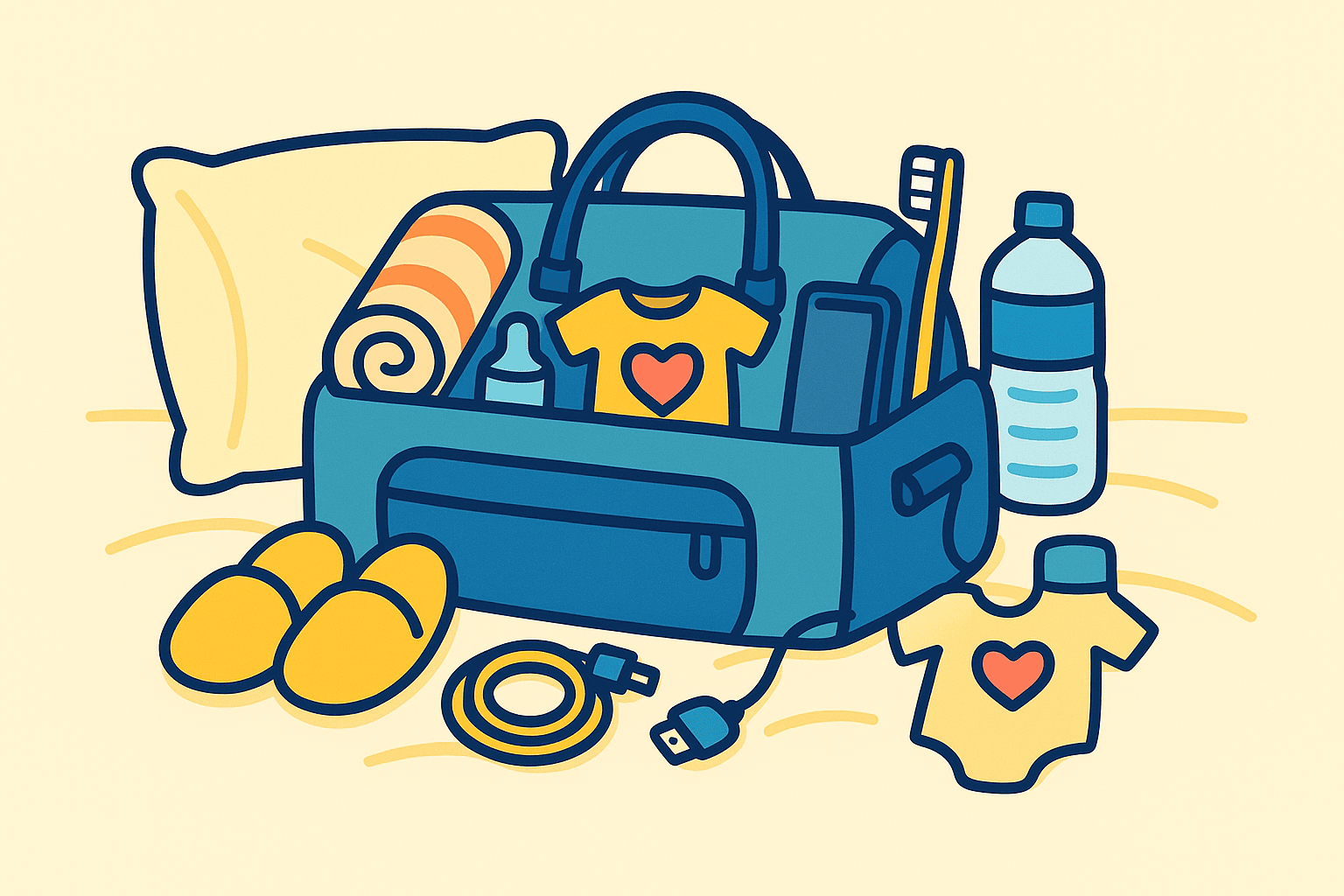*We're parents too. By buying products via our affiliate links we may earn a commission to support our growing family at no cost to you!
Hospital Bag Checklist: What to Pack for Labor and Delivery
Quick Answer
Pack your hospital bag between 34-36 weeks with essential documents, comfortable clothing, toiletries, and baby’s going-home outfit. Focus on comfort items for labor and recovery, plus the infant car seat for bringing baby home safely.
In This Guide
- Essential documents and identification
- Comfort items for labor and recovery
- Baby’s going-home essentials
- Partner and support person packing list
- Optional items and what to skip
- Hospital bag timeline and organization tips
All Products in This Guide
Essential items for your hospital bag and bringing baby home safely
Our Recommendations
(10 products)









Create Your Registry
Amazon Baby Registry
*Subject to availability and Retailer's terms.
We earn commissions from these links.
Preparing Your Hospital Bag: When labor starts, the last thing you want is to be scrambling for your phone charger or favorite socks. Use this checklist to pack your hospital bag by about 34-36 weeks (a month or so before your due date). This ensures you’ll be ready to go at a moment’s notice and have all the comforts and essentials for labor, delivery, and the trip home.
Must-Have Documents & Essentials
Photo ID, Insurance Info, and Birth Plan: Keep your driver’s license or ID and insurance card handy - you’ll need them at check-in. If you have a written birth plan, pack a copy in a folder so your support team can easily reference it. A folder or binder is also useful to organize any paperwork or brochures the hospital gives you.
Cell Phone + Charger: You’ll want your phone to update family or take those first photos of baby. An extra-long charging cable (6-10 feet) is helpful since hospital outlets might be far from the bed. Consider a portable charger for backup power.
Wallet with Some Cash: While hospitals typically accept cards, having a small amount of cash can be useful for vending machines or parking. Your support person will appreciate cash for cafeteria runs.
Comfort Items for Mom
Comfortable Clothing: Pack a loose robe or open-front nightgown for during your hospital stay (great for skin-to-skin and nursing). Bring a going-home outfit that was comfy in your second trimester - postpartum bodies need time before pre-pregnancy clothes fit. Think stretchy leggings or maternity sweatpants and a roomy top. Don’t forget a pair of flip-flops or shower sandals for walking around and showering.
Nursing Bras and Pads: If you plan to breastfeed, include 2-3 nursing bras (or supportive sports bras) and some disposable or washable nursing pads. Even if you’re not nursing, a supportive bra can help; a nurse advises that snug sports bras can ease discomfort if you choose not to breastfeed.
Toiletries and Personal Care: Pack travel-size versions of your essentials: toothbrush and toothpaste, face wash, deodorant, lip balm, hair ties, brush, and any skincare must-haves. Hospitals have basic toiletries, but using your own can make you feel more human. Include glasses or contacts supplies if you wear them. Hospitals can be dry, so lotion is nice to have, and don’t forget eyeglasses even if you usually wear contacts.
Postpartum Care Items: The hospital will provide things like heavy-duty pads, mesh underwear, and a peri bottle for rinsing - and even extra items to take home like peri rinse bottles, diapers and wipes. However, you might pack a few of your favorite postpartum items if you have preferences: for example, a soft toilet paper roll (hospital TP can be scratchy on sore skin), a postpartum recovery belt if you plan to use one, or your preferred nipple cream like the Earth Mama Organic Nipple Butter. Having these on hand can make recovery more comfortable.
Postpartum Essentials
Postpartum recovery belts, nipple cream, and peri bottles help with comfort and healing after delivery.
Snacks and Drinks: Labor can be long, and hospital food options might be limited at odd hours. Throw in some of your favorite snacks (granola bars, nuts, electrolyte drinks). Honey sticks or lollipops can be good quick energy during labor if allowed. Also, pack an empty water bottle - nurses will keep you hydrated, but having your own big water bottle with a straw can be convenient.
Tech and Support Aids
Entertainment: While you might not use it, consider packing light entertainment: earbuds for music, a downloaded playlist or a calming app, or a book/Kindle for downtime. Many moms don’t touch these, but a long induction or early labor might have lulls. It can’t hurt to have a favorite show downloaded on a tablet for distraction.
Comfort Aids: If you have items for pain relief or relaxation, bring them. Examples: a tennis ball or massage roller for back rubs, a stress-relief essential oil (check hospital policy), or a small LED candle (real candles aren’t allowed) to create a calm environment. A lightweight robe or cozy socks/slippers can also keep you comfortable and mobile during early labor.
Charging Devices & Camera: We mentioned phone chargers, but also consider a camera if you want high-quality photos beyond your phone’s ability. Ensure batteries are charged or pack spare batteries/SD cards. Your partner can handle photo duty while you recover.
For the Baby
Infant Car Seat (installed): A must-have for bringing baby home. Install your rear-facing car seat like the Chicco KeyFit 30 Infant Car Seat at least a few weeks before your due date and have it checked by a professional if possible. Many hospitals will not let you leave by car without demonstrating that the baby is safely buckled in. Pro tip: do not use thick bunting or snowsuits in the car seat; they can be unsafe in a crash. Instead, use car seat blankets like the Aden + Anais Muslin Swaddle Blankets over the straps if it’s cold.
Newborn Going-Home Outfit: Pack one newborn size outfit and one 0-3 month size outfit, since you won’t know baby’s exact size. A footed sleeper or onesie/pant combo with a soft hat is perfect. Ensure clothing is weather-appropriate (e.g., a warm fleece onesie for winter or a light cotton one for summer). It’s wise to choose something that opens in front or has a wide neck - easier to dress a delicate newborn. Also pack a pair of socks or booties and mittens if the outfit doesn’t have footies or fold-over cuffs.
Receiving Blanket or Swaddle: Bring 1-2 soft receiving blankets like the Aden + Anais Muslin Swaddle Blankets. They are multi-purpose: you can swaddle baby for the car ride or use a blanket as a cover. Hospitals typically provide basic swaddle blankets while you’re there, but you might prefer your own cute design for those first photos or the trip home. If it’s winter, you could bring a warmer blanket to lay over the car seat (after baby is strapped in) for the ride.
Pacifier (Optional): Most hospitals have newborn pacifiers available if you want one, and some lactation consultants advise waiting on pacifiers to establish breastfeeding. This is personal preference - if you think you’ll use a pacifier, you can pack one, but it’s not mandatory.
(Note: You do not need to pack diapers, wipes, bottles, or formula for the hospital stay - the hospital will provide all the baby’s needs while you’re there. Save your supplies for when you get home!)
For Your Partner or Support Person
If you have a partner or friend staying with you, remind them to pack for themselves too. Their list can include a change of comfortable clothes (they should expect some mess, so not their favorite outfit), toiletries, phone/charger, snacks, and any daily medications they need. A pair of sweatpants or pajamas and a sweater can be useful since hospital rooms can be chilly at night. They might also want a pillow and light blanket from home - sometimes the hospital-provided chair or couch isn’t the comfiest for overnight stays. And yes, they should bring their own mask and earplugs if they’re light sleepers, since hospitals are noisy. Lastly, a little cash for vending machines or cafeteria runs is important (support people get hungry too, and the cafeteria might close overnight).
Nice-to-Haves (Optional Items)
Pillow or Bath Towel from Home: Hospital pillows and towels are functional but not luxurious. Bringing your own plush pillow (in a non-white pillowcase so it doesn’t get mixed up) or a big towel can make showers and sleep more comfortable. Just be prepared that they may get stained.
Postpartum Pillow/Donut: If you anticipate needing extra cushioning to sit (especially after a vaginal birth), a small donut pillow or just a soft cushion can help ease pressure when sitting in the hospital bed or on the ride home. Consider the Frida Baby Mom Postpartum Recovery Kit for comprehensive recovery support.
Small Speaker or Playlist: If you have a labor playlist or relaxation music, you can bring a small Bluetooth speaker. Keep volume low and respectful of hospital policies. Many moms find calming music or even a portable sound machine helpful for rest.
Thank-You Treats: This is completely optional, but some parents bring a bag of candy or small gifts for the nurses’ station as a thank you. It’s a sweet gesture if you feel up to it (but rest assured, it’s not expected).
What to Skip Packing
You can leave high-value jewelry or anything you’d hate to lose at home - you likely won’t wear it, and it would be one more thing to keep track of. Avoid packing pre-pregnancy jeans or form-fitting clothes for leaving the hospital; they likely won’t fit yet and can make you feel uncomfortable. Don’t bother with a breast pump - if you need one during your stay, the hospital can provide a hospital-grade pump. And there’s no need for lots of baby toys or books; newborns will basically sleep or feed and aren’t ready for toys yet. Finally, don’t stress if you forget something. In a pinch, your hospital might have spares (toothbrushes, pads, even phone chargers) or a loved one can fetch that item for you. The most important things - your baby and your medical care - will be there even if your favorite chapstick isn’t. As one maternity nurse reassures, “Your healthcare team will make sure you and the baby are fine,” even if not everything goes exactly to plan.
Frequently Asked Questions
Q:When should I pack my hospital bag?
A: Pack your main hospital bag between 34-36 weeks. Double-check it at 37-38 weeks and keep it ready by the door from 39 weeks on.
Q:What's the most important item to pack?
A: Your infant car seat is the most critical item - hospitals won't let you leave without it properly installed and the baby safely buckled in.
Q:Do I need to pack diapers and wipes?
A: No, the hospital provides all baby essentials including diapers, wipes, bottles, and formula during your stay. Save your supplies for when you get home.
Q:How many outfits should I pack for the baby?
A: Pack one newborn size and one 0-3 month size outfit for going home. You won't know the baby's exact size, so having both sizes ensures you're prepared.
Q:What should my partner pack?
A: Your partner should pack comfortable clothes, toiletries, phone/charger, snacks, medications, and cash for vending machines. They might also want a pillow and blanket from home.
Packing Timeline
34-36 weeks: Pack your main hospital bag with all essentials 37-38 weeks: Double-check your bag and add any last-minute items 39+ weeks: Keep your bag by the door and ready to grab
Remember, every hospital and birth experience is different. This checklist covers the basics, but feel free to customize it based on your specific needs and preferences. The key is to be prepared without overpacking - you want to be comfortable and have what you need, but you don’t want to lug unnecessary items around the hospital.
Start Your Registry Today
Want Personalized Recommendations?
Our AI tool creates a custom registry in 2 minutes based on your lifestyle, budget, and living space. Get instant product picks tailored to your family's unique needs.
Build My RegistryAmazon Baby Registry
*Subject to availability and Retailer's terms.
We earn commissions from these links.
Related Guides

Feeding Essentials: Breastfeeding vs Formula Checklist
Prepare for your baby's feeding journey with essential items for breastfeeding and formula feeding. Get comprehensive checklists for both feeding methods.

Baby Travel Essentials: Complete 2025 Guide
Whether it's a quick trip to the store or a weekend visit to grandma's, traveling with a baby means packing smart. Here are the baby travel essentials for 2025.

Registry Checklist For Small Spaces
Living in a small apartment or home with a new baby on the way? Here's how to create a complete baby registry without cluttering your limited space. Get ex.
